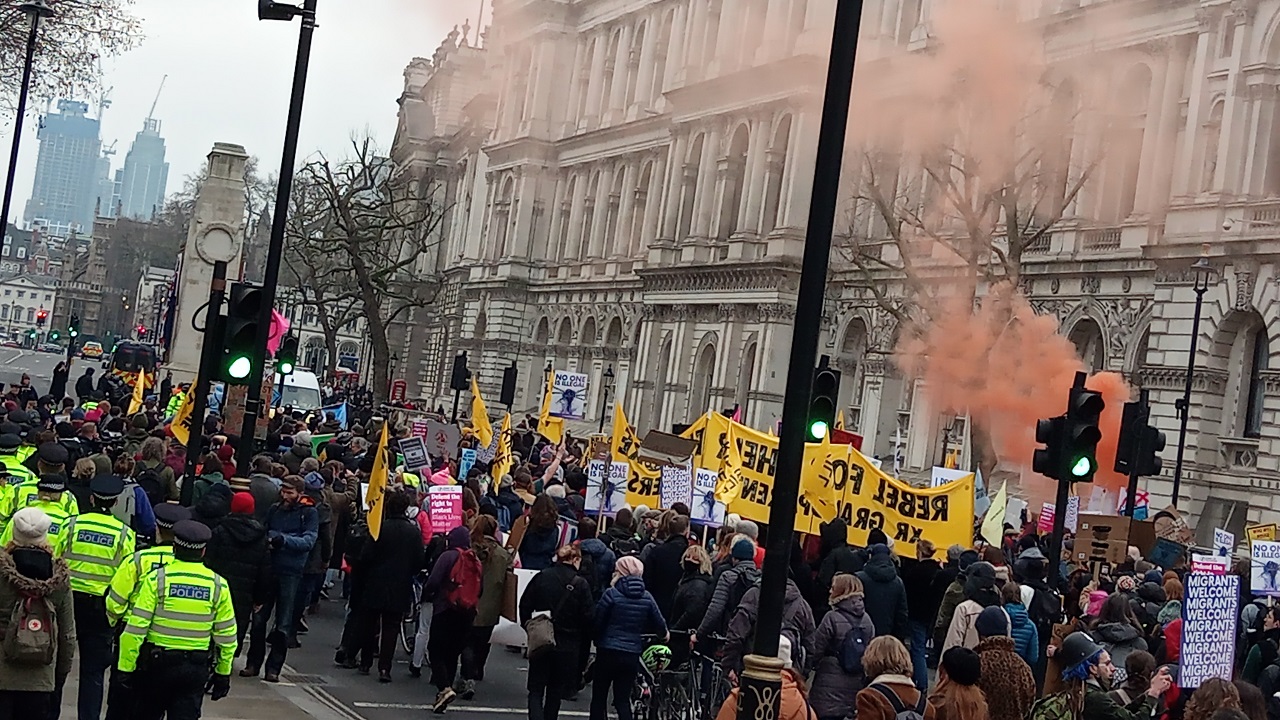The House of Lords have voted to scrap Police, Crime, Sentencing and Courts bill clauses condemned by Human Rights organisations, in the wake of nation-wide “Kill the Bill” protests.
Article 20 of the Universal Declaration of Human Rights enshrines in international law that “everyone has the right to freedom of peaceful assembly and associationâ€. Written in 1948 after authoritarianism – in all of its forms – held a vice-like grip on the world throughout WWII, the declaration exists as a reminder that such rights are not set in stone, and that the spectacle of demonstration serves as an important means for the public to defend its other rights from breach.
For months, human rights activists have feared that this right would be threatened in the UK from the Police, Crime, Sentencing and Courts (PCSC) bill, with Amnesty International having called for it to be “dropped entirely†in written evidence to the Joint Committee on Human Rights.
On January 15, as the bill entered the final report stage in the House of Lords, activists across the country took to the streets in 28 UK cities, London being but one. Three days later, it was revealed that the protest, among other actions, proved effective. The House of Lords voted to scrap the amendments that would have restricted the right to protest and expanded stop-and-search powers; to repeal the Vagrancy Act 1824, and proposed amendments to address misogyny as a hate crime, as well as spiking.
London’s Action: A Protester’s Eye View
Saturday saw people gather at 12pm at Lincoln Inn Fields in Holborn, near the London School of Economics. Many waved fluorescent Extinction Rebellion (XR) flags, but they were far from the only group present.

A selection of groups at the protest
Those who once had little in common – anti-vaxxers, anti-Assange extradition activists, trade unionists, BLM activists, communists, anarchists, feminists, trans rights activists, pan-Africanists, Turkish anti-fascists, Labour activists and Jewish socialists – found common ground for this one shared cause. “We are here not just for one cause but for all of themâ€, one speaker told the crowd.
At 1pm, they filled the streets. Over the course of an hour, Chancery Lane, Fleet Street, Aldwych, the Strand, Whitehall, and Parliament Square were filled with people, flags, and the soon-to-be-criminal sound of drums. XR protesters stained the air pink and orange with Indian Holi-style chalk dust – the kind easily washed away by rain.

Left: an XR de-escalation volunteer speaks to young by-standers; Right: blocked traffic on the Strand

Some protesters briefly beginning a sit-in, only to be moved along shortly after
While the taxi drivers blocked from their destination were visibly displeased, none appeared – in the words of the bill – intimidated, harassed, seriously uneasy, alarmed, or distressed. Protesters in white jackets would pass alongside the traffic and onlooking pedestrians, answering questions and easing concerns. Meanwhile, those in orange negotiated with police to ensure the disruption caused did not exceed what was necessary. While some protesters sought to start a sit-in on the Strand, they were quickly moved along, and the march proceeded.
At Parliament Square, protesters occupied the road, legs crossed and sat in a circle like attentive pupils in a classroom, around a central platform on which eight key speakers addressed them.
The speakers, as diverse as those protesting, comprised of Baroness Shami Chakrabarti; London MPs John McDonnell and Jeremy Corbyn; trade unionist “Aunty†Zita Holbourne; GRT activist Sherrie Smith; journalists and political satirists Mark Thomas and Heydon Prowse; and co-ordinator of the Muslim LGBT network Ejel Khan.

Left: A quick meal on the move to Whitehall, Right: The Houses of Parliament
They addressed the crowd until 5pm, speaking on the racialised consequences of this bill and its cousin, the Nationality and Borders Bill – a bill which the New Statesmen found threatened the citizenship rights of two in every five BAME Britons. One person gave a dedication to Sasha Johnson, the prominent Oxford-based BLM and Kill the Bill activist who was shot and hospitalised in May last year and so could not be present for the protest.
Meanwhile, protesters prepared and passed out free hot meals – tomato and bean pasta or curried potatoes – to keep each other warm and well.
What was in the Bill:
On Protest:
The PCSC bill had been condemned by human rights organisations such as: Liberty, Amnesty UK, and the Good Law Project for “targeting the manner, the method, the location and even the volume of demonstrations†and for allowing the Secretary of State to effectively define what constitutes serious disruption.
“This subsection will allow the State to further target the protests of any group it does not like without the scrutiny of primary legislationâ€, Liberty argued.
These organisations also condemned the bill for threatening to “normalise and entrench racialised discriminatory practice†and to persecute Gypsy, Romani and Traveller (GRT) people in Britain.
On Racial Discrimination:
Part 2, Chapter 1 would have required local government authorities such as schools, prisons, and in youth custody to supply information to local police and sets conditions on data protection rights to do so. Amnesty feared that this would “entrench†racial discrimination by exacerbating “several systemic failings†they identified in the Metropolitan Police service’s Gangs Matrix.
In a similar vein, Part 10, Chapter 1 and the imposition of ‘Serious Violence Reduction Orders’ on a “balance of probability†that an individual is in possession of an offensive weapon was feared to set ‘a very low threshold to criminalise’.
Anyone who “ought to have known†a weapon was present might have been stopped and searched without necessarily possessing a weapon under this clause, meaning that any individual might have been subject to stop-and-search “without any suspicion of being involved in any current crimeâ€, something which Black and Ethnic Minority people are known to be more often subjected to.
On Statues:
Part 2, chapter 4 of the bill has been widely criticised for rendering anyone destroying a “memorial†or statue punishable under the Criminal Damage Act 1971, carrying a maximum sentence of 10 years.

The Winston Churchill statue, casually defended by onlooking police officers
ITV News noted that this is far higher than the maximum sentences for attacks on living people, with the maximum sentence for common assault held at six months, 5 years for actual bodily harm, and grievous bodily harm rarely seeing sentences over 10 years (even though its highest penalty is life imprisonment.)
Mark Thomas argued at the protest that “statues have more rights under this bill than womenâ€, comparing the sentence to those imposed for rape. While the maximum sentence for this crime is life imprisonment, it is a crime that is rarely prosecuted and punished with a 5-year sentence on average, according to Stuart Miller solicitors.
The Lords discussed raising the minimum sentence for rape to 7 years, bringing the respective punishments for these crimes closer together.
What is Missing?
On GRT Rights:
Human rights organisations and activists condemned Part 4 for threatening GRT people by seeking to establish trespass as a criminal (as opposed to civil) offence, and by allowing police to seize vehicles and property they suspect to be owned by or “under control of†a Traveller – effectively rendering them homeless.
The House of Lords, however, voted not to amend this clause by 167 to 71.
All transcripts and proposed changes to the bill are available here.
Home Secretary’s Response and a Breakdown of Voting by Party
Even though many parts of the bill have been maintained, Home Secretary Priti Patel attacked the Lords’ amendments via Twitter, blaming the blockage on the Labour Party and disparaging the protesters.
Last night Labour blocked the Government from introducing new measures to stop Insulate Britain & XR bringing our country to a standstill.
Once again Labour’s actions are proving they are not on the side of the law-abiding majority – instead choosing to defend vandals and thugs.
— Priti Patel MP (@pritipatel) January 18, 2022

Breakdown of votes by party on clause 57: imposing conditions on public assemblies, © House of Lords
Her analysis of the data is misleading, however. Regarding ‘Clause 57: imposing conditions on public assemblies’ specifically, while the majority of Conservative Lords indeed voted to maintain it, a combination of votes from Labour, Liberal Democrat, Crossbench, Bishops and other party peers allowed for it to be defeated.
Furthermore, the data shows that three Conservative peers refused to tow the party line, joining members of the opposition to vote against clause 57. These dissenting peers were Baroness Rona Alison Fairhead, Lord Howard Emerson Flight, and Baroness Helen Margaret Newlove.
A full breakdown of the votes for each clause is available here.


















